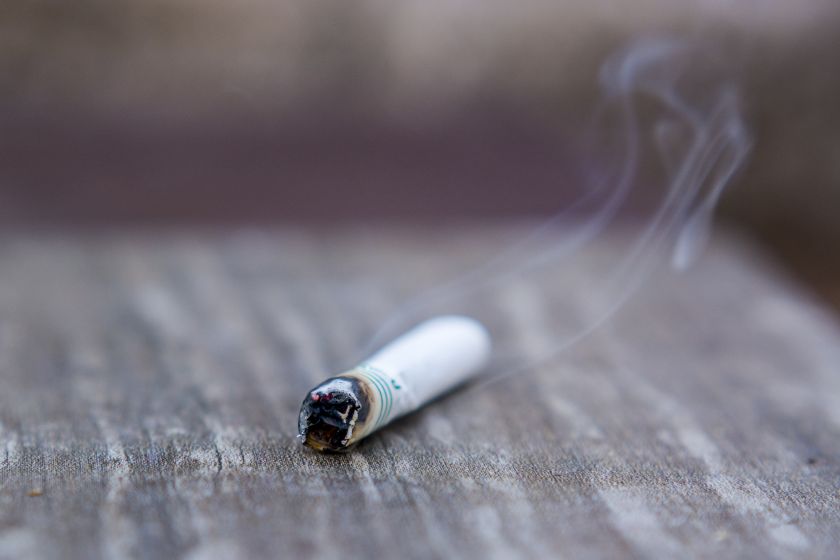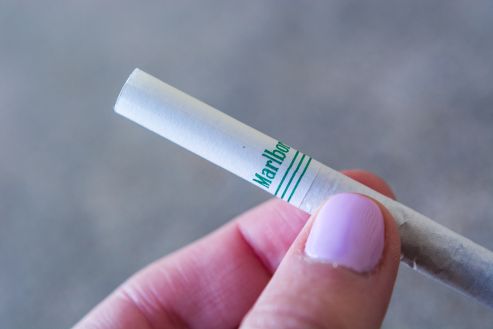
It has been seen so many times, students standing outside of a convenience store smoking a cigarette and they look like they are maybe old enough to be in the seventh grade.
Better yet, a student actually walking out of the local middle school and lighting up after he or she had a “stressful day” in the classroom. Tobacco21.org notes, “We grant access to alcohol, gambling, and handguns at age 21. Smoking is statistically much more deadly than any of these other risky behaviors.” So, why is the legal buying age for tobacco set lower than age 21?
Currently across the United States, 43 of the 50 states allow tobacco products to be purchased by anyone at the age of 18 or older. In four states, New Jersey, Alabama, Utah and Alaska, the legal buying age is currently set at 19 years of age. But two states have made huge changes.
On Friday, June 19, 2015, Hawaii became the first state to raise the legal buying age for tobacco to 21. California just raised the minimum buying age on March, 11, 2016. According to tobaccofreekids.org, “as of January 19, 2016, at least 115 localities in nine states have also raised the minimum legal sale age for tobacco products to 21,” but Hawaii and California are the only places in the US that have made it a state wide law.
Changing the laws is not easy and preemption language in various states’ legal codes prevent many local governments from imposing their own minimum sales age for tobacco, which currently includes Pennsylvania.
It is argued that by raising the buying age to 21, high school students will have a much harder time accessing the drug. Currently, high school juniors and seniors can buy tobacco products at age 18 and bring them into a high school setting, which is shared with students ranging from 14 to 18 years of age.
Sarah Grant, junior pre-med major, thinks raising the age may deter some young students from smoking. “I think it might help because you’re right, they [21 year olds] are in a different environment where they wouldn’t have as much access to younger people,” Grant said.
“I think raising the buying age will decrease access to cigarettes because currently there are plenty of high schoolers aged 18,” Susan Ruskowski, registered nurse, said. “In addition to being able to buy cigarettes for themselves, there is a strong possibility that they are currently obtaining cigarettes for their younger friends. Raising the buying age to 21 decreases this possibility.”
According to a recent study by the Institute of Medicine entitled, Public Health Implications of Raising the Minimum Age of Legal Access to Tobacco Products, “among adults who become daily smokers, approximately 90 percent report first use of cigarettes before reaching 19 years of age, and almost 100 percent report first use before age 26.”
Anthony Pasqua, senior English major, falls into the first category.
“I have a lot of family problems at home and both my parents have smoked for 20 plus years,” Pasqua said. “One night it got really bad so I went out to a party after all this took place and bought a couple of packs of cigarettes.” Pasqua was just 18 at the time.
Pasqua lives in New Jersey, one of the four states where the buying age for tobacco is 19. When he started smoking at age 18 he was not old enough to buy himself cigarettes.
“I had a whole year where a work friend of mine, who was 19, would buy me cigarettes,” Pasqua said.

In high school, Pasqua said that a lot of his friends who were athletes used chewing tobacco and he also knew a handful of people who smoked cigarettes. To access tobacco they sometimes got away with not being carded when going to purchase or they would have a friend of legal age buy it for them. Hence the reason 16 year olds are seen outside with a thick, gray smoke looming in front of their faces, since tobacco is often easily acquired by underage students.
Although Grant believes raising the buying age to 21 might stop some underaged students from smoking, she feels that the government should consider going about the law differently. “I think a more effective way of going about stopping younger people from smoking would be to actually make it illegal for younger people to smoke, not just for them to get a hold of the cigarettes,” Grant said. “[At this point] when you see a younger person smoking you can’t really do much.”
Deanna Horvath, a current junior in high school, does not think that raising the buying age of tobacco would necessarily deter high school aged students from choosing to smoke or use other tobacco products.
Most likely, “the 18 year old [who currently uses tobacco] knows someone who is 21 who will supply the tobacco for them and for their friends as well,” Horvath said.
Even though many oppose the idea of raising the legal buying age and feel that people will still find a way to get around the law, there is still a huge push for the buying age to be raised. If the legal buying age does wind up being raised, it is believed that the overall health of many Americans will improve over time.
During the study conducted by the Institute of Medicine, a tobacco simulation model was used to predict health changes in America, “if the minimum age of legal access were raised now to 21 nationwide, there would be approximately 223,000 fewer premature deaths, 50,000 fewer deaths from lung cancer and 4.2 million fewer years of life lost for those born between 2000 and 2019.”
“As a pediatric nurse, any activities that risk a teens health is a concern,” Ruskowski said. “Because the damage caused by cigarette smoking is long term and not readily appreciated by young people, it is a challenge to have the risks appreciated. By making it harder for teens to gain access to cigarettes there is a chance the delay will allow them to make a more informed decision when they are 21.”
Editors note: This story was changed to reflect the recent law enacted in California. The article originally stated:
Currently across the United States, 44 of the 50 states allow tobacco products to be purchased by anyone at the age of 18 or older. In four states, New Jersey, Alabama, Utah and Alaska, the legal buying age is currently set at 19 years of age. But one state has made a huge change.
On Friday, June 19, 2015, Hawaii became the first state to raise the legal buying age for tobacco to 21. According to tobaccofreekids.org, “as of January 19, 2016, at least 115 localities in nine states have also raised the minimum legal sale age for tobacco products to 21,” but Hawaii is the only place in the US that has made it a state wide law.


